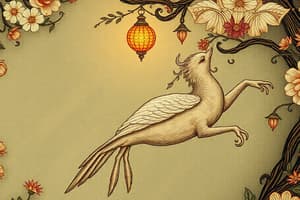Podcast
Questions and Answers
What is a verse?
What is a verse?
- A poetic device
- A type of poetic form
- A unit of poetry such as a stanza or a line (correct)
- A rhyme scheme
What is blank verse?
What is blank verse?
Unrhymed iambic pentameter
What defines free verse?
What defines free verse?
Poetry free of any restrictions; poetry not tied to a particular pattern
What is figurative language?
What is figurative language?
What does personification refer to?
What does personification refer to?
What is hyperbole?
What is hyperbole?
What is a simile?
What is a simile?
What is a metaphor?
What is a metaphor?
What does imagery refer to in poetry?
What does imagery refer to in poetry?
What is connotation?
What is connotation?
What does denotation mean?
What does denotation mean?
What is diction?
What is diction?
What is a rhyme scheme?
What is a rhyme scheme?
What does rhythm refer to in poetry?
What does rhythm refer to in poetry?
What is meter in poetry?
What is meter in poetry?
What is alliteration?
What is alliteration?
What does refrain mean in poetry?
What does refrain mean in poetry?
What is onomatopoeia?
What is onomatopoeia?
What is a stanza?
What is a stanza?
What is a couplet?
What is a couplet?
What is a quatrain?
What is a quatrain?
What is a heroic couplet?
What is a heroic couplet?
What is a narrative poem?
What is a narrative poem?
What is a lyric poem?
What is a lyric poem?
What defines a sonnet?
What defines a sonnet?
What is an elegy?
What is an elegy?
What defines a ballad?
What defines a ballad?
What is an ode?
What is an ode?
What is a haiku?
What is a haiku?
What characterizes a limerick?
What characterizes a limerick?
What is visual poetry?
What is visual poetry?
What defines a found poem?
What defines a found poem?
Flashcards are hidden until you start studying
Study Notes
Poetry Terms and Definitions
- Verse: Represents a single unit in poetry; can be a line or a stanza.
- Blank Verse: Defined as unrhymed poetry that follows iambic pentameter, maintaining a rhythmic structure without rhyme.
- Free Verse: Characterized by a lack of restrictions; does not adhere to traditional patterns or forms, allowing freedom in expression.
- Figurative Language: Encompasses language that conveys meanings beyond the literal interpretations, enriching the text.
- Personification: Involves attributing human traits or emotions to animals or inanimate objects, enhancing relatability.
- Hyperbole: A rhetorical device that employs extreme exaggeration to emphasize a point or create a dramatic effect.
- Simile: A comparison between two distinct things using "like" or "as," often to create vivid imagery.
- Metaphor: A direct comparison between two elements without using "like" or "as," suggesting one thing embodies another.
- Imagery: Utilizes descriptive language to engage the senses, allowing readers to visualize the scenes depicted in the poem.
- Connotation: Refers to the emotional associations and interpretations linked to a word, beyond its straightforward meaning.
- Denotation: The exact, literal meaning or dictionary definition of a word, providing clarity in language.
- Diction: Relates to the specific word choices made by an author, influencing tone and style.
- Rhyme Scheme: The structured pattern of rhymes at the end of lines within a stanza, which can enhance musicality.
- Rhythm: The systematic pattern of stressed and unstressed syllables that gives poetry its flow and movement.
- Meter: Refers to the recurring rhythmic pattern that governs how poetry is structured, often foundational to poetry's musical quality.
- Alliteration: The repetition of initial consonant sounds in adjacent or closely connected words, adding a lyrical quality to the text.
- Refrain: A repeated phrase or line throughout a poem, contributing to its overall theme or emotional resonance.
- Onomatopoeia: The creation of words that phonetically imitate the sound associated with the object or action they refer to, enhancing sensory experience.
- Stanza: A grouping of lines within a poem, serving as a structural unit akin to a paragraph in prose.
- Couplet: Consists of two consecutive lines of verse that rhyme, often conveying a complete thought.
- Quatrain: A stanza made up of four lines, which can vary in rhyme patterns.
- Heroic Couplet: Comprises two rhyming lines that form a complete thought, typically written in iambic pentameter.
- Narrative Poem: A form of poetry that tells a story, characterized by elements such as a plot and characters.
- Lyric Poem: Shorter poems focused on expressing personal emotions and thoughts.
- Sonnet: A fourteen-line poem that often reflects the poet's personal feelings, commonly associated with themes of love.
- Elegy: A mournful poem that grieves over the death of a significant individual.
- Ballad: A narrative poem that recounts a story, often in a dramatic form and suitable for singing.
- Ode: A formal and often elaborate poem written in praise of a person, event, or subject.
- Haiku: A traditional Japanese poem consisting of three lines with a 5-7-5 syllable structure, focusing on nature and evoking contemplation.
- Limerick: A playful, humorous poem consisting of five lines, characterized by a distinctive rhythm and rhyme pattern.
- Visual Poetry: Combines the visual arrangement of text on the page with poetic expression, relying significantly on layout for impact.
- Found Poem: A poem created from existing texts or words, discovered and re-contextualized to convey new meaning.
Studying That Suits You
Use AI to generate personalized quizzes and flashcards to suit your learning preferences.




